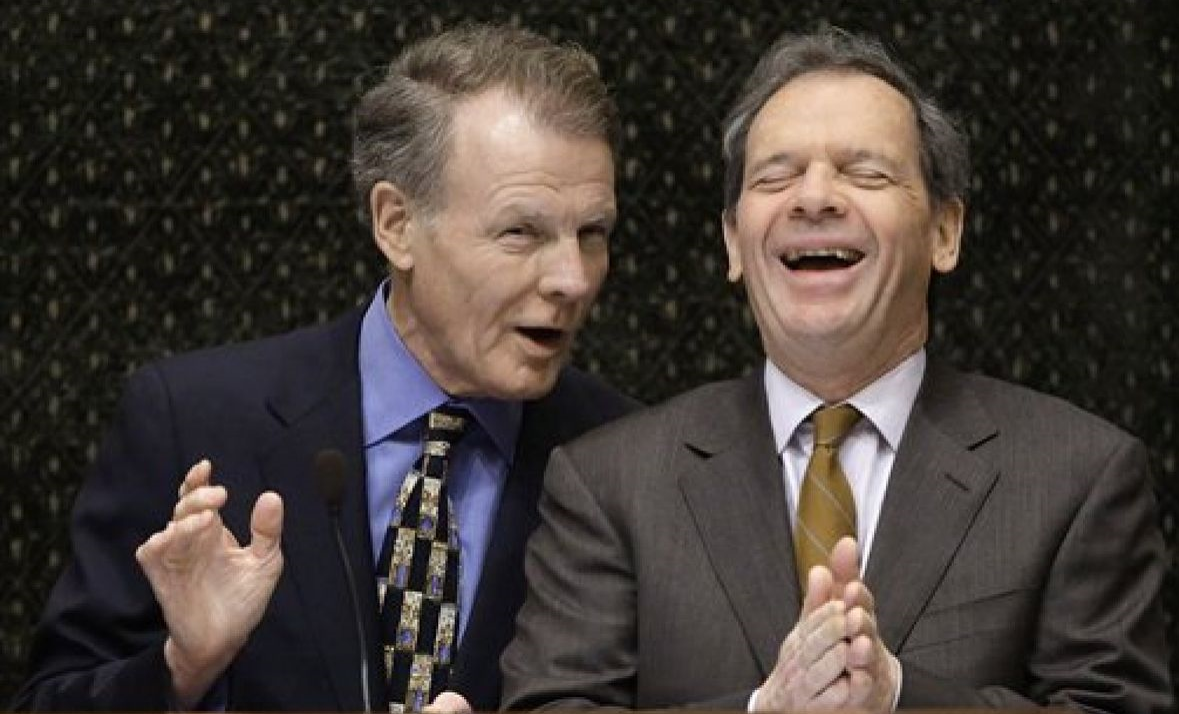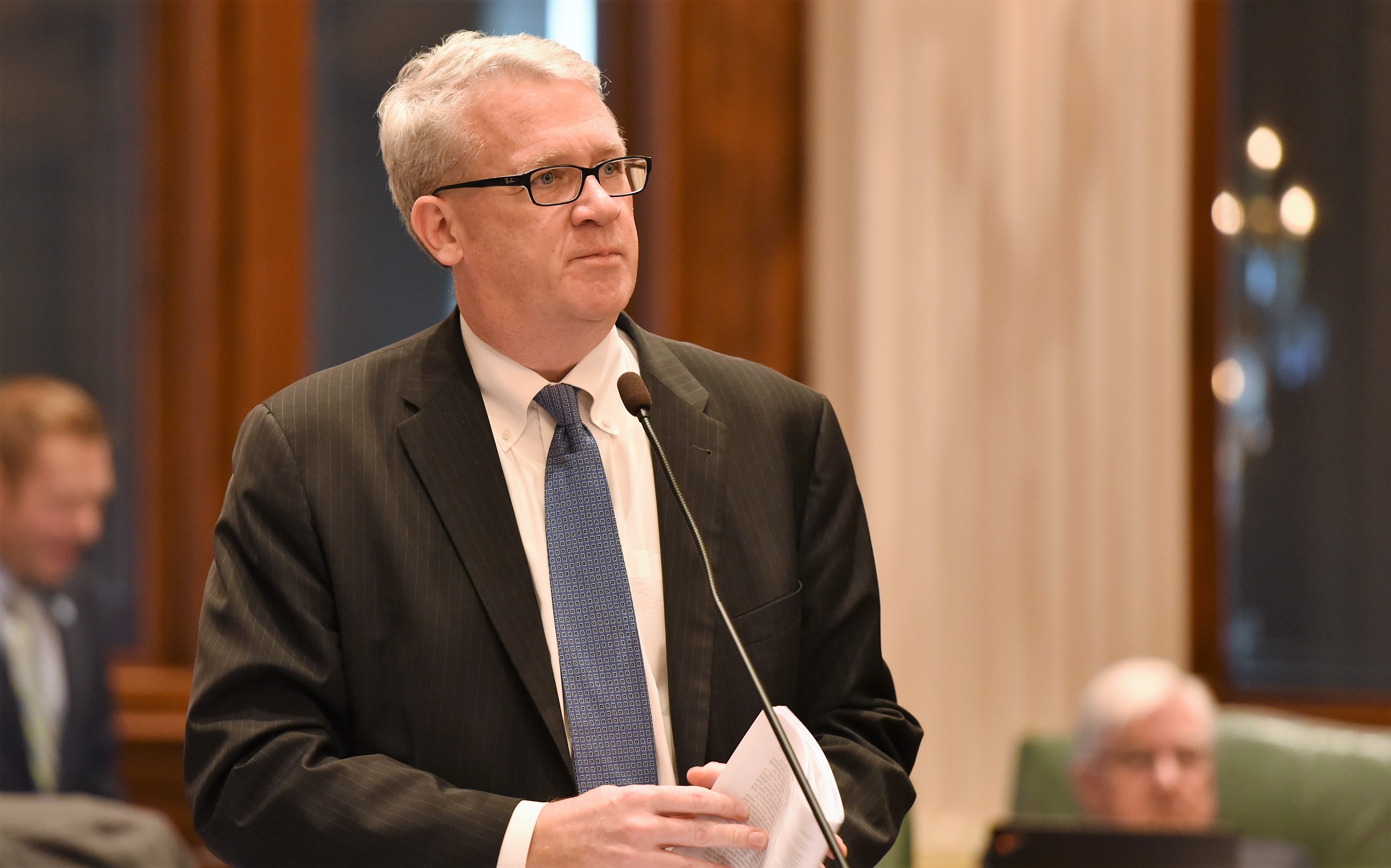At least 31 House Dems, including 3 members of Speaker Madigan’s leadership team, have stated they support or are open to some form of leadership term limits
“The people of Illinois do not vote for legislative leaders, but they strongly support the concept of term limits. That’s why Illinoisans deserve the opportunity to amend the constitution via a binding ballot referendum and term limit the four legislative leaders. Governor Pritzker, all members of the State Senate, all House Republicans, and at least 31 House Democrats, including 3 members of Speaker Madigan’s leadership team, have voiced support for some form of leadership term limits.
“There is a bipartisan super-majority that supports leadership term limits. The votes are there to pass a constitutional amendment referendum in both chambers. It’s time for the General Assembly to finally act on this critical issue and take one step towards restoring the people’s control over state government.” – Illinois Republican Party Spokesman Aaron DeGroot
Three of the four legislative caucuses in the Illinois General Assembly have instituted some form of leadership term limits.
Through a unanimously-adopted resolution of their chamber rules, Illinois Senate Democrats and Republicans imposed a five-term, ten-year limit on the Senate President and minority leader for the 101st General Assembly. The Senate first enacted this term limit in the 100th General Assembly. That resolution was also unanimously-adopted.
Illinois House Republicans have enacted term limits on their caucus leader via their caucus rules.
And even Governor J.B. Pritzker has stated he supports leadership term limits.
That leaves the Illinois House Democrats – the only legislative caucus without some form of leadership term limits. The House Democratic caucus has been led by Speaker Michael Madigan for decades – 18 terms as Speaker of the House and several more terms as minority leader – but that doesn’t mean House Democrats are opposed to leadership term limits.
At least 31 House Democrats, including 3 members of Speaker Madigan’s leadership team, have affirmatively stated that they support or are open to some form of leadership term limits or term limits on all legislators.
Here are House Democrats in their own words:
Kelly Cassidy: “Yes… I have cosponsored legislation creating leadership term limits.” (Chicago Tribune candidate questionnaire)
Asst. Majority Leader Linda Chapa LaVia: “Chapa LaVia pointed out… that she has voted for term limits for the legislative leadership.” (The Beacon-News, 2/10/17)
Deb Conroy: “I am supportive of leadership term limits.” (Daily Herald candidate questionnaire, 10/15/18)
Melissa Conyears Ervin: “I believe voters could benefit from having new voices and new ideas on a regular basis. But if term limits are going to be applied to the legislature, they should be applied so they include statewide officials, as well.” (Chicago Sun-Times candidate questionnaire)
Terra Costa Howard: “I think term limits sound like a really good idea to voters who are frustrated with unresponsive governments and legislative deadlock.” (Daily Herald candidate questionnaire, 10/10/18)
Jerry Costello, II: “Costello said he supports term limits for the leadership of the General Assembly.” (Republic-Times, 7/18/18)
Asst. Majority Leader Fred Crespo: “I support term limits for legislators as well as constitutional officers.” Daily Herald candidate questionnaire, 10/13/16)
Anthony DeLuca: Introduced a constitutional amendment that, if approved by voters, would prohibit State Representatives and State Senators from serving more than 3 terms in their respective chambers (HJRCA 1, 101st G.A.)
Mary Edly-Allen: “While term limits on leaders may help, the only way to keep so much power out of the hands of so few is to overhaul our campaign finance system and limit the amount of money in our elections.” (Daily Herald, 10/31/18)
Sara Feigenholtz: “Yes, [I support term limits for legislative leadership positions].” (Chicago Tribune candidate questionnaire)
Robyn Gabel: “I support term limits for leadership and proposed such legislation in 2011.” (Chicago Tribune candidate questionnaire)
Jennifer Gong-Gershowitz: “I believe in term limits for legislative leadership because those positions are not directly elected by the voters of Illinois.” (Chicago Tribune candidate questionnaire)
Mike Halpin: “Halpin ok with term limits for leadership positions” (WHBF-TV, 9/12/16)
Fran Hurley: “I do support term limits on leadership positions.” (Chicago Tribune candidate questionnaire)
Stephanie Kifowit: “I am open to considering proposals for leadership term limits.” (Chicago Tribune candidate questionnaire)
Theresa Mah: “I do support term limits for legislative leaders.” (Chicago Tribune candidate questionnaire)
Asst. Majority Leader Natalie Manley: “If a term limit proposal ever appears on a ballot, I will support whatever decision my constituents make.” (Chicago Tribune candidate questionnaire)
Joyce Mason: “I am supportive of term limits for legislative leaders.” (Daily Herald candidate questionnaire, 10/23/18)
Rita Mayfield: “I support term limits at every level: local, county, state and federal.” (Daily Herald candidate questionnaire, 10/13/16)
Bob Morgan: “I support term limits for legislative leaders to ensure that voices from across Illinois are heard in the lawmaking process.” (Chicago Tribune candidate questionnaire)
Marty Moylan: “I support term limits for legislators.” (Daily Herald candidate questionnaire, 10/12/18)
Michelle Mussman: “I support giving voters a say in a constitutional amendment to establish term limits for statewide and legislative offices.” (www.votemichelle.org/issues)
Diane Pappas: “I believe in a democracy it should be up to the voters, not the legislature, to decide whether Illinois should adopt term limits via a referendum placed on the ballot.” (Daily Herald candidate questionnaire, 10/12/18)
Delia Ramirez: “I am open to considering legislation that establishes term limits but cannot offer unilateral support on this issue without seeing the specific language for the legislation being proposed.” (Chicago Tribune candidate questionnaire)
Lamont Robinson, Jr.: “Voters should decide their representation, but we should lean towards limiting decades-long legacies from developing. I think 20 years is plenty of time to perfect your craft and really make improvements in your districts. I will commit to sponsoring legislation to that end.” (Chicago Tribune candidate questionnaire)
Anne Stava-Murray: “Term limits for legislative leaders are necessary to avoid dangerous consolidations of power.” (Daily Herald candidate questionnaire, 10/22/18)
Karina Villa: “Villa supports term limits for all state representatives, including Madigan.” (Daily Herald, 9/24/18)
Mark Walker: “Yes, I think there should be term limits on legislative leaders and I would vote in favor of this.” (Daily Herald candidate questionnaire, 10/12/18)
Ann Williams: “I’m open to limits on leadership, though I don’t believe there will ever be another leader who will serve as long as the Speaker so I don’t think the issue will be very relevant in the future.” (Chicago Tribune candidate questionnaire)
Lance Yednock: “What [Yednock] is certain about is term limits… [Yednock] believes a decade is enough time for one individual to hold office but is open to discussing alternative limits.” (The Times, 10/20/18)
Sam Yingling: “I have always supported term limits…Yes, [I support term limits for legislative leadership positions].” (Chicago Tribune candidate questionnaire)
Republican State Rep. Tim Butler is currently carrying a leadership term limit constitutional amendment in the House, HJRCA 12. Democratic State Sen. Jennifer Bertino-Tarrant is currently carrying a similar measure in the Senate, SJRCA 3. Last session, Senate Republican leader Bill Brady also carried a similar measure, SJRCA 2, that had bipartisan support.
There is a bipartisan supermajority that supports leadership term limits. It’s time for the General Assembly to finally act on this critical issue and take one step towards restoring the people’s control over state government.
###



